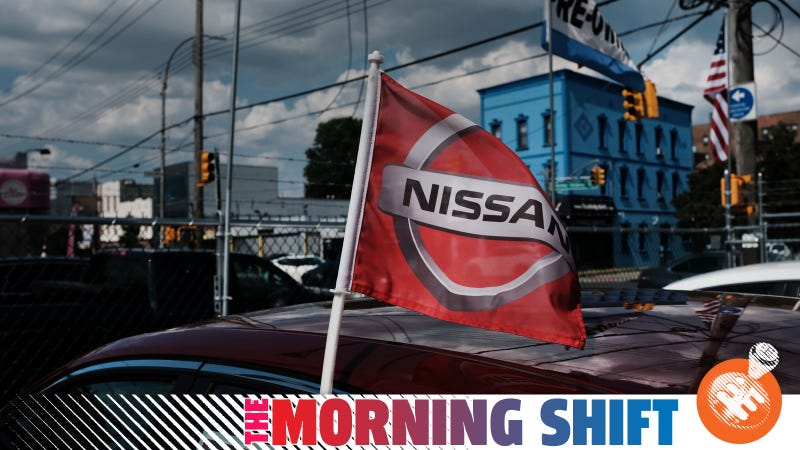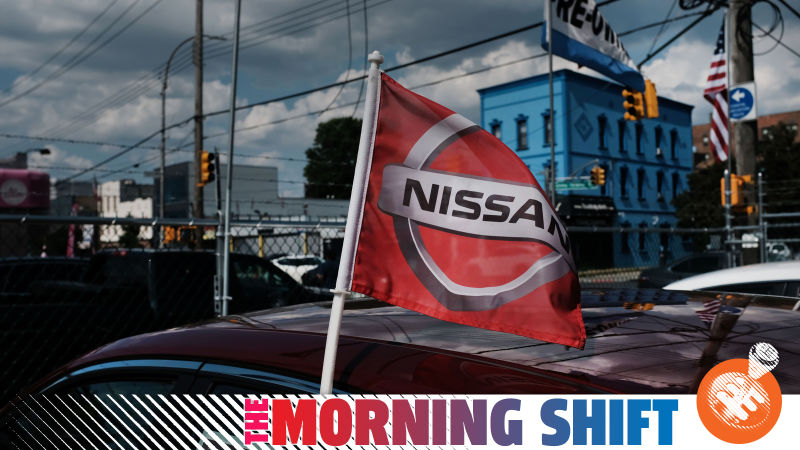
 The Morning ShiftAll your daily car news in one convenient place. Isn’t your time more important?
The Morning ShiftAll your daily car news in one convenient place. Isn’t your time more important? Nissan has a new boss, again, the General Motors vs. the United Auto Workers showdown marches on, America contends with China and more for The Morning Shift of Tuesday, Oct. 8, 2019.
1st Gear: Meet The New Nissan Boss
Makoto Uchida was named Nissan’s new CEO and president today, and he takes the reins at a time when the global automaker is deeply embattled.
Advertisement
Sales are way down, profits are too, the brand’s identity is unclear, its luxury division is getting its ass kicked left and right, and he’s the third guy with the top job in just a few years. Former Nissan-Renault megaboss Carlos Ghosn was ousted amid criminal financial misconduct charges in Japan, and his successor Hiroto Saikawa also had to step down after admitting he and other executives were overpaid as part of a stock-related payment plan.
So basically, things are great. Who wouldn’t want that job.
Who is Makoto Uchida, then? I’d say he’s kind of a safe choice. As Automotive News notes, he’s 55, a Nissan veteran, has great relationships with the partners at Renault, has helped lead the all-important China market and is seen as a “younger” executive who can perhaps help stabilize things.
From that story:
His selection was announced by Chairman Yasushi Kimura and Masakazu Toyoda, director in charge of Nissan’s nomination committee, at a press press conference Tuesday evening in Tokyo.
“The board concluded that Uchida is the right leader to drive the business forward,” Kimura said. “We expect Uchida to lead the company as one team, immediately focus on the recovery of the business and revitalize the company.”
Uchida will take the helm from Yasuhiro Yamauchi, who has been serving as interim president since Saikawa stepped down Sept. 16. Yamauchi will stay as acting CEO until the handover.
The company also announced that Ashwani Gupta, 49, a former Nissan and Renault executive who is now COO of third alliance partner Mitsubishi Motors Corp., will be Nissan’s new COO.
Jun Seki, 58, the engineer who currently the senior vice president in charge of performance recovery, was appointed as vice COO, reporting to Gupta. It was unclear what will happen to current vice COO Christian Vandenhende, who joined Nissan from Renault only in 2018.
Kimura and Toyoda said the three men were chosen because they have international experience, prioritize speedy decision making and represent a fresh start for the company.
“It is very important to demonstrate a new Nissan,” Kimura said. “We selected people who could represent a new Nissan in a strong way.”
Advertisement
So what’s on tap?
To get there Nissan said it will refresh all core models and introduce more than 20 new ones, expand the sales of electrified vehicles and triple sales of automated driving vehicles. Nissan also wants to optimize global production capacity by 10 percent and cut some 12,500 jobs worldwide.
Advertisement
More cars, more electrification, more autonomy, more job cuts. Sounds about right.
2nd Gear: No Tariffs On Japanese Cars, For Now
One small ray of hope for Nissan and others is that for now, the U.S. won’t use one of President Donald Trump’s favorite weapons: tariffs on imported cars. As part of a deal with Japan over agriculture, imported automobiles from that country won’t face additional tariffs. From Bloomberg:
The accords on agriculture and digital trade cover about $55 billion worth of commerce between the world’s largest and third-largest economies, U.S. Trade Representative Robert Lighthizer said at a ceremony in the Oval Office alongside Trump.
The accord is a “game changer for our farmers” and ranchers, Trump said at the event.
The goal is for the accord to take effect Jan. 1.
Trump, who faces re-election next year, was eager to make a deal with Japan to appease U.S. farmers who have been largely shut out of the Chinese market as a result of his trade war with Beijing. American agricultural producers, also reeling from bad weather and low commodity prices, are a core component of Trump’s political base.
Under the deal, Japan will lower or reduce tariffs on some $7.2 billion of American-grown farming products, including beef and pork.
Prime Minister Shinzo Abe’s priority was to win a pledge that the U.S. won’t slap tariffs on Japanese automobile exports, a sector valued at about $50 billion a year and a cornerstone of the country’s economy.
Advertisement
Good news for consumers too, since we end up eating the cost of the tariffs.
3rd Gear: A Tale Of Two Cities
Here’s a good read from Bloomberg about two GM towns, Orion Township and Hamtramck in Michigan, tasked with making the Chevrolet Bolt (including driverless variants) and soon possibly nothing, respectively.
Every decade or so, GM undergoes a transformation to ensure the company’s long-term survival. Invariably, these makeovers turn some communities into winners and others into losers. Hamtramck was one of five North American factories targeted last November for possible closing as GM accelerates a shift aimed at producing 20 electric vehicle lines—one or two of them potentially driverless—by 2023. The plant in Orion Township was first spared, then presented with money and jobs.
GM takes pains to frame these decisions as strictly business, and their guts indeed reflect simple math: To turn even a small profit, an automaker must generally sell at least 80% of whatever a plant can produce. When a company has several factories running at about half their capacity, as GM did last year, it’s losing money on real estate, equipment, and personnel.
But as the twin tales of Orion and Hamtramck show, the decisions also reflect history, politics, labor contracts, and geography. And all these factors, especially the raw numbers, are subject to continual evaluation. Poletown and Orion both produce money-losing cars. If the electric- and driverless-car revolution doesn’t play out the way GM expects, Orion, too, could face a reckoning.
Advertisement
That’s because:
Or maybe the electric-and-driverless utopia won’t materialize as swiftly as Barra expects. At the moment, GM is selling fewer than 20,000 of its $37,500 Bolts a year—less than a tenth of the sales of the company’s full-size pickups. According to a recent AAA survey, 71% percent of Americans are fearful of autonomous vehicles. Ford Motor Co. CEO Jim Hackett told the Detroit Economic Club in April that the industry has “overestimated the arrival” of self-driving cars. Barra has backed off GM’s goal to offer robo-taxi rides to the public by the end of this year, saying instead that the company’s autonomy unit will run a service when the technology is safe enough.
Advertisement
And as we’ve covered before, EVs generally mean fewer parts and less labor needed for manufacturing, so it’s not exactly an enviable choice for workers looking to secure their futures.
4th Gear: On That Note
Speaking of, the GM-UAW strike continues as negotiations move at a snail’s pace. And as GM awaits the union’s latest response tonight, one hot button issue is how the two entities find each other at odds over what the future looks like. Via The Detroit Free Press:
The company was still awaiting the union’s response by early evening, two people close to negotiations said. Details of what was in the proposal remain confidential, they said.
But key to the union’s demands is a stronger guarantee that GM will build traditional vehicles, as opposed to electric or autonomous cars, in U.S. plants, said one of the people. GM CEO Mary Barra has said GM envisions an all-electric future and more self-driving cars. She has said GM would transform primarily into a technology company that makes cars.
That vision is at odds with the UAW’s desire to ensure job security for its members.
“GM is not interested in cars in the future,” said a person close to the negotiations. “We’re still a ways away from the electric vehicles and the autonomous vehicles. As you go to the electric vehicles and autonomous vehicles, they don’t take as many parts and less manpower to assemble.”
That means fewer union jobs in the future.
Yeah, maybe? I don’t think the EV revolution is avoidable at this point, but it’s still a ways away. Hopefully, a balance can be achieved there.
Advertisement
5th Gear: Audi’s CEO Is Optimistic About The Electric Future
Audi has said that it will have 20 full-electric models by 2025, and CEO Bram Schot told Automotive News that that is what the market wants, too, with 40 percent of its sales expected to be electric by then. That’s even if we still have a long way to go when it comes to infrastructure.
Advertisement
Via Auto News:
What is your biggest challenge on the investment side?
Finding the right balance on where we put our money to achieve the maximum impact. How do we split our investments in full-electric cars and plug-in hybrids? How do we tackle autonomous driving and shared mobility on the investment side? This is really challenging as all these business models are linked and we have to take into account various external factors such as infrastructure.
What is the toughest part of getting customers to consider electric vehicles?
The feedback we get from customers driving EVs every day is extremely positive. The majority of them say they are hooked on electric now. Therefore, we need to create more opportunities for them to test electric cars.
Is the recharging infrastructure still an issue in Europe?
Yes. Electric mobility has to become suitable for everyday use. That is why we offer our e-tron customers the e-tron Charging Service. They have access to more than 110,000 charging points throughout 20 European countries. At the same time, it is crucial that the overall availability of charging points has to be scaled. Only then will e-mobility spread.
Advertisement
Reverse: The Cow Was Later Exonerated
Advertisement
Neutral: How Does Nissan Turn It Around?
Pretend you’re Uchida. What do you do?















